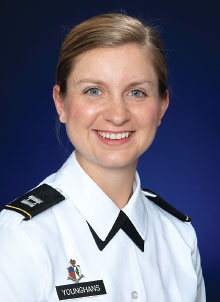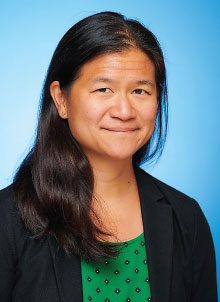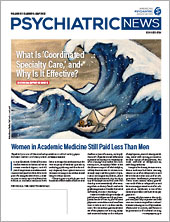Two APA members have been awarded a fellowship by the Japanese Society of Psychiatry and Neurology (JSPN) to present at its 118th annual meeting in June in Fukuoka, Japan.
The fellowship was created to recognize outstanding early career psychiatrists, allow the sharing of novel research-based solutions to global issues, and foster camaraderie and collaboration among young psychiatrists around the world. Among the dozen awardees chosen are APA members Chelsea Younghans, M.D., a third-year resident at National Capital Consortium, and Alison Hwong, M.D., Ph.D., a fellow at the National Clinician Scholars Program in the Department of Psychiatry and Behavioral Sciences at the University of California, San Francisco.
The award is presented to psychiatrists with less than 10 years’ experience; just two are nominated from each World Psychiatric Association member society a year. The 2022 JSPN Award focuses on efforts to maintain the mental health of the general population and health care workers, as well as foster continuity of psychiatric care for individuals with serious mental illness during the COVID-19 pandemic.
Younghans will give a presentation about the pressure the pandemic has placed on physicians and outline its analogies to the moral injuries experienced by members of the military on the front lines. Hwong will present on several local and regional California programs aimed at reducing barriers to mental health care during the pandemic. One of those is the Frontline Workers Counseling Project, a charitable organization founded by psychiatrist Elizabeth Rawson, M.D., and psychologist Michael Levin, Psy.D., both private practitioners in San Francisco. Hwong was among hundreds of psychiatrists, psychologists, and other clinicians licensed in the San Francisco Bay Area who joined the project and provided free counseling and group therapy to frontline and essential workers in Northern California.
“It’s a creative response to the intense need for mental health care for frontline workers, and participating has been incredibly gratifying. This project opens doors for health care workers to access mental health support quickly and easily in this time of crisis, many of whom had never before reached out. … These were patients with increased anxiety, distress—a lot of secondary trauma from witnessing so much disease, death, and suffering—who didn’t have places to process their feelings themselves.”
The project in turn offers seminars about trauma and provides volunteers with resources and support, Hwong added. Since its launch in March 2020, the project has connected frontline workers with thousands of hours of free psychotherapy and support groups, according to its website.
Hwong sees analogies between the pandemic and another of her research topics, climate change. Both are long-term phenomena that require long-term mental health solutions, she said. “We need to address adaptation and resilience and form a global community response.” She is looking forward to learning about other community mental health responses at the JSPN conference. “There’s so much richness in sharing ideas across cultures with other clinicians from around the world. ... It’s hard to imagine a better time to gather with a global community to try to find solutions for mental health.”
Lessening Physician ‘Moral Injury’
With the opportunity provided by this international platform, Younghans told Psychiatric News she plans to focus her presentation on the mental health of physicians. She believes that the pandemic has shone a spotlight on their well-being, which has long been neglected. She plans to discuss the similarities between the moral injury associated with being on the front lines of war and being a health care worker on the front lines of the pandemic.
“The pandemic has increased awareness of the disparities within our country, emphasizing what happens when there aren’t enough medical resources and placing physicians and health care workers at the helm of these types of life-and-death decisions. As a military psychiatry resident, I have a unique opportunity to work with individuals who make difficult ethical decisions on every deployment, which can lead to moral injury,” she told Psychiatric News. “This is analogous to decisions being made by health care professionals today.”
Younghans has treated a number of physicians who have sought help, she said. “Seeing how much of oneself physicians give in medicine, there needs to be some other way to fill up that cup. Sometimes physicians are stuck and don’t know how to get that help; they just continue to give of themselves.” This important issue was brought to the forefront for her when earlier in her training, her mentor, a well-loved and highly regarded junior attending physician did not find a way to come forward and died by suicide.
“My goal is to greatly reduce the number of health care workers who fall victim to the vicious cycle of hopelessness and moral injury,” she said. Younghans plans to apply for a child and adolescent psychiatry fellowship later this year.
Both Hwong and Younghans said they are grateful to APA for the support given to them. ■


